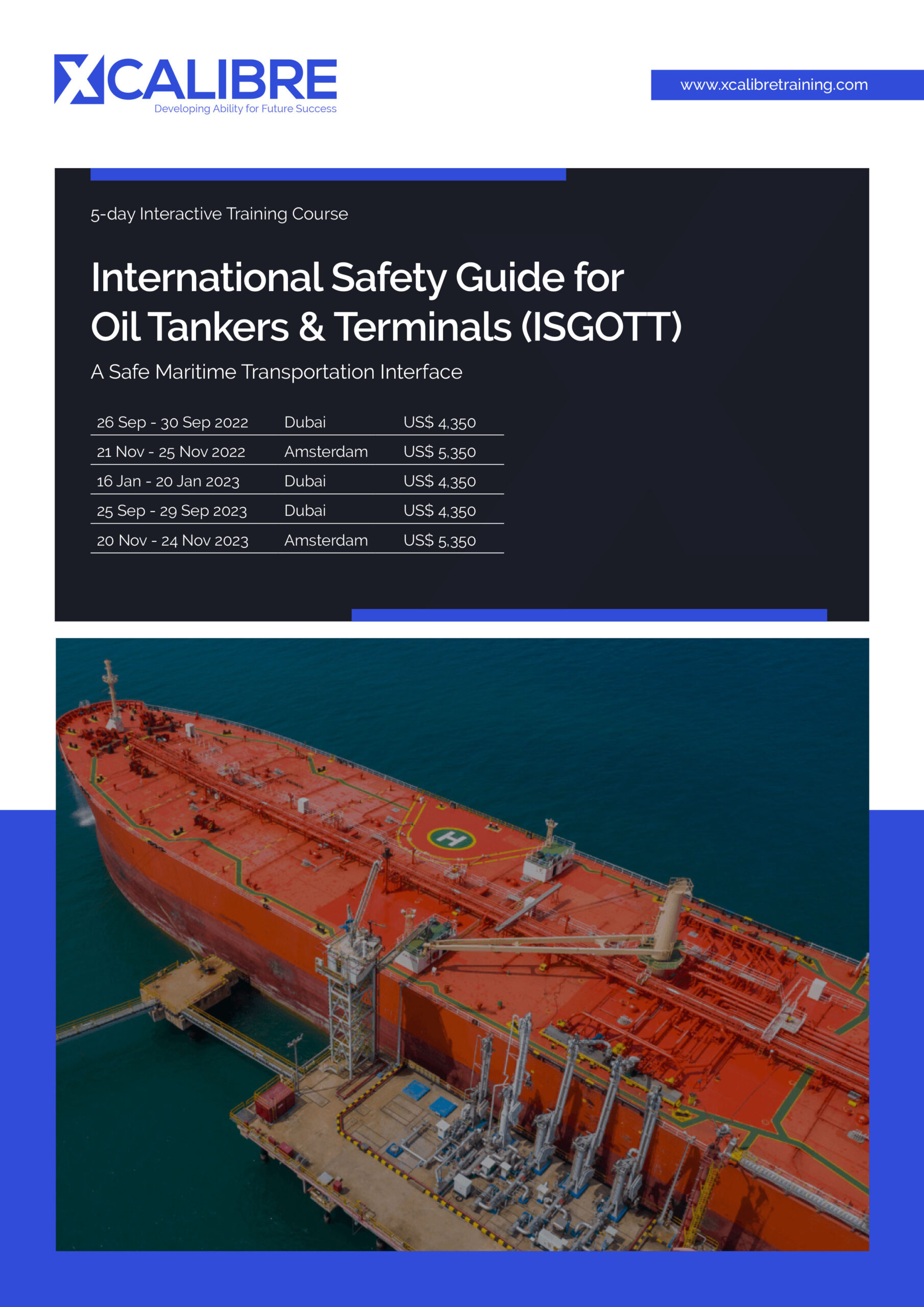| Date | Venue | Fee | |
|---|---|---|---|
| 21 Sep - 25 Sep 2026 | Dubai – UAE | $ 5,950 | Register Now |
| 16 Nov - 20 Nov 2026 | Amsterdam - The Netherlands | $ 5,950 | Register Now |
| 11 Jan - 15 Jan 2027 | Dubai – UAE | $ 5,950 | Register Now |
About the Course
Safety is of paramount importance in the tanker sector; the International Chamber of Shipping (ICS), the Oil Companies International Marine Forum (OCIMF), and the International Association of Ports and Harbors (IAPH) organisations support the main regulatory body, the International Maritime Organisation (IMO), in this most critical issue they have prepared a joint International Safety Guide for Oil Tankers and Terminals (ISGOTT).
ISGOTT training course provides guidance to individuals working in tankers and terminals concerning the safe transportation and handling of crude oil and petroleum products within these facilities. The most updated ISGOTT (sixth edition) has four different parts; Part 1 General Information, Part 2 Tanker Information, Part 3 Marine Terminal Information and Part 4 Ship/Shore (Tanker/Terminal) Interface. This training course draws attention to safe maritime transportation and the ISGOTT, the key points and barriers in oil tankers and terminal interfaces, measures in the workplace from the organisational to the personal level. It will have several important goals, one of which is to advise personnel directly involved in tanker and terminal operations and acquire information that will assist the delegates in developing a Safety Management System within their own company.
Core Objectives
The delegates will achieve the following objectives:
- Understand the latest trends of Oil Companies International Marine Forum (OCIMF)
- Know the guide for Marine Terminal Competence and Training Guide (MTCOT)
- Familiarise the safety procedures for tanker and terminal personnel
- Understand the recommendations for tanker and terminal personnel
- Know Ship Inspection REport (SIRE) & Chemical Distribution Institute (CDI) inspections
- Know about international maritime rules and the ISGOTT relationship
Training Approach
This training course will use various proven learning techniques to ensure maximum understanding, comprehension, and retention of the information presented. The training course will follow a participative workshop format. It will be focused on developing practical skills that delegates can apply in real-life business situations upon return to their organisation.
The Attendees
This training course benefits all responsible personnel and managers in the maritime field to learn ISGOTT, the international maritime rules and regulations regarding the ISGOTT, and to increase situational awareness about safe maritime transportation.
Likewise, it will be valuable to the professionals but not limited to the following:
- Technical Managers
- Ship Operators
- Terminal Operators
- Environmental Managers
- Ship Inspectors
- Superintendents
- Captains and Chief Engineers
Daily Discussion
DAY ONE: INTRODUCTION AND ISGOTT
- International Safety Guide for Oil Tankers and Terminals (ISGOTT)
- Procedures and Recommendations Regarding Safety
- International Marine Forum (OCIMF)
- Marine Terminal Competence and Training Guide (MTCOT)
- International Maritime Rules and ISGOTT Relationship
DAY TWO: MATERIAL SAFETY DATA SHEET (MSDS)
- Introduction to MSDS
- International Ship and Port Facility Security Code (ISPS Code)
- Tanker Management Self-Assessment (TMSA)
- The SIRE Inspection and Reporting System
- Regasification
- LNG Transfer Systems
DAY THREE: SIRE AND CDI INSPECTIONS
- SIRE Inspections
- CDI Inspections
- Tanker Management
- Other Inspection Instruments
- Enforcements
DAY FOUR: OPERATIONS MANAGEMENT
- Transfer from Ship to the Platform and Directly Between Ships (STS)
- Capacity for Organisational Management
- Terminology Regarding Quantity and Quality
- Use of Instruments
- Protocols
DAY FIVE: EMERGENCY CASE INSTRUCTIONS
- Emergency Response Operations Management
- Contingency Equipment
- Oil Spills and LNG Leakages
- Kind of Responses
- Compatibility
Certificate Awarded
Upon successful completion of this training course, participants will be awarded a Certificate of Completion from XCalibre Training Centre, acknowledging their accomplishment. This certificate serves as a testament to their dedication to developing their skills and advancing their expertise in their respective fields.



